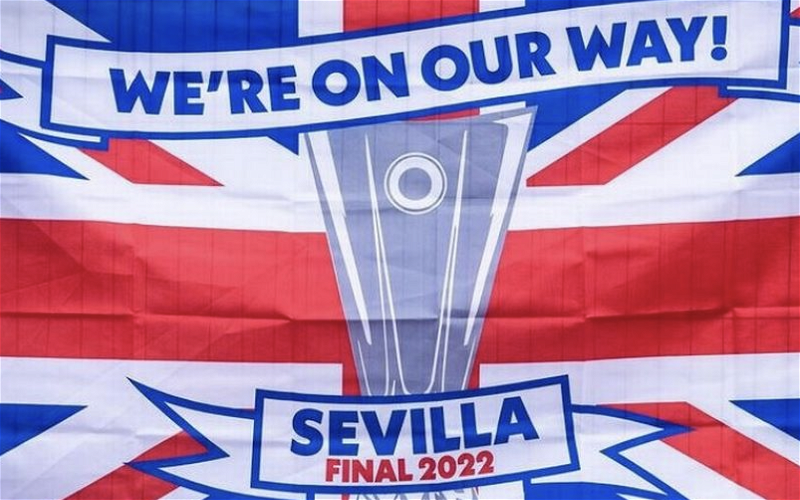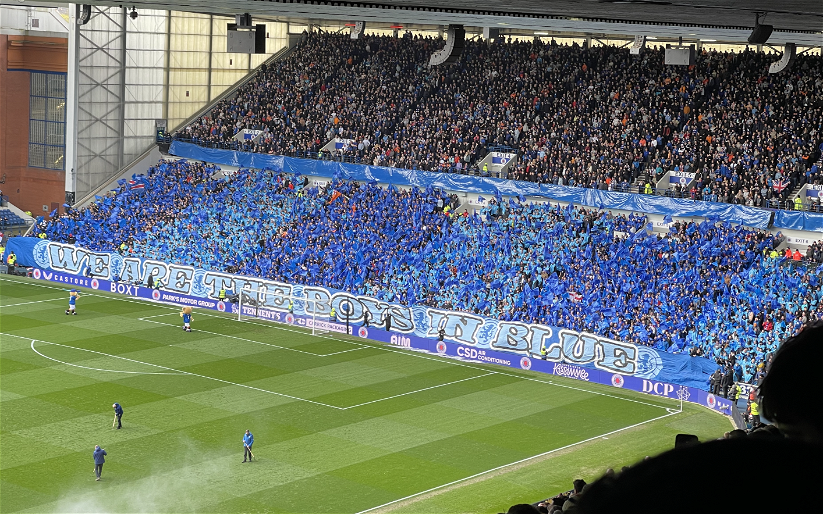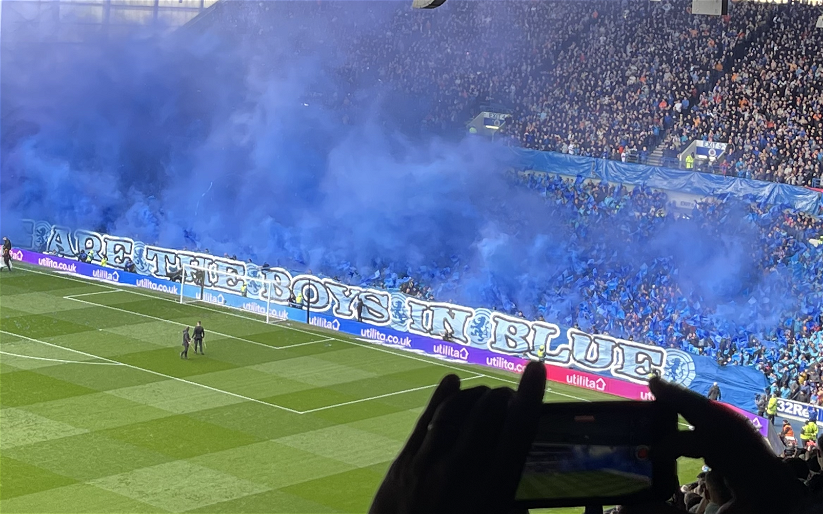By David Herd
When Rangers reached the Europa League final last season, there was some debate on where this achievement sat in the history of Scottish clubs in continental competition. The fact we failed to lift the trophy by the narrowest possible margin ended that particular line of discussion in the media, but as Rangers fans could we possibly be living through the greatest sustained period of European achievement in club history? Seville 2022 came at the end of 4 seasons of continuing improvement and consistently impressive results against many higher ranked teams. The Gerrard and van Bronckhorst eras in Europe deserve at least to be compared with past glories, and this three-part article tries to give the evidence for and against 3 periods of Rangers European history being considered the best of all so far.
Those three periods are 1957-1962, 1966-1972 and 2018-2022.
Before even considering the achievements of 2018-2022, we should take a minute to put into context the starting point of this period in the club’s history as well as how European football has changed since the other 2 periods covered in this series.
Rangers in 1957-1962 and 1966-1972 were a team regarded as a giant in European football, a team who regularly won honours, and who expected to be able to compete with anyone. In 2018, Rangers had just finished 3rd in the SPFL again, for the second time since they had climbed back out of the wasteland of Scottish lower division football. The last honour won was in 2011, and since then the fans had endured financial collapse, the bloodlust of demotion to Division 3, and the real fear the club might disappear completely as the boardroom was occupied by shysters and leeches. Even after the club was won back into safe hands, the initial seasons in the top flight were an often-humiliating experience, with regular hammerings by Celtic and the only European campaign ending in the worst-ever defeat in continental competition in Luxembourg and the manager of the time being interviewed in a hedge.
At the end of 2017/18 it was all summed up in 3 excruciating matches. Celtic’s 4-0 and 5-0 wins in cup and league showed the gulf between the teams as wide as the Pacific, while a 5-5 last-day draw at Easter Road showed just how slapstick the team could be at any time. The club then surprised the football world by appointing Liverpool legend Steven Gerrard as the new manager, a massive worldwide name in the game taking his first steps into management. He had a daunting task ahead, but from his first European match in charge on July 12th 2018, Rangers were no longer anyone’s pushover.
And European football was now very different from in those eras of the past that have previously been described. The vast riches of the major European leagues has created a gulf between Scottish football and the biggest countries that compares to Rangers and Division 2 sides in Scotland. UEFA competitions are massively weighted to allow clubs from these bigger countries into the lucrative later stages, with the smaller nations having to scrap their way through qualifiers just to be allowed at the same table as the big boys. There are seedings and coefficients used, and in 2018 Rangers had no recent European participation of any note and were therefore banished down among the smallest of the minnows in this big pond with a club ranking of 233rd in Europe, something unthinkable at any other time in history. Add to that, the massive increase in the number of countries that make Europe up, meaning clubs can play as many matches before Christmas as the number that used to be an entire European season and they are only then in the last 16 or 32.
There’s also the fact that football teams in most countries are now made up of players from all corners of the globe, unlike 50+ years ago when the vast majority of teams were composed of players from their home nation. This allows the biggest leagues to attract the very best talent on the planet. In 1957-62 and 1966-72, Rangers were equals to anyone, nowadays despite the club’s massive worldwide fanbase and illustrious history, even the biggest Scottish club is seen as cannon fodder by the megarich elite.
In July 2018, Macedonian side Shkupi visited Ibrox in a Europa League first qualifying round match, played at a time when the big clubs across the continent were still on holiday. Jamie Murphy scored the first goal of this new Gerrard age, with captain James Tavernier giving a glimpse of things to come when he added a second from the spot. A 0-0 draw in Macedonia meant progression into the second qualifying round, with Rangers now unseeded and needing to defeat three higher ranked opponents to just reach the tournament proper, which in modern times starts with a group stage to maximise income as well as try to stop the big boys going out early if they have an off night.
Croatian side Osijek, featuring a left back named Borna Barisic, were defeated 2-1 on aggregate thanks to an impressive single goal away win with a goal by Alfredo Morelos. The Colombian would go on to make club history over the coming seasons in continental competition. The first “big” scalp of this new era came next, with the Solvenians of Maribor defeated 3-1. Although not exactly a European giant, they were a club who had played in two of the previous three Champions League group stages, knocking Celtic out on the way to one of them. The final qualifying round saw Russian side Ufa defeated 2-1 on aggregate, with Rangers holding out despite going down to nine men in the return leg in Russia after red cards to Morelos and full-back Jon Flanagan.
It was relatively uncommon for a team to get through all four rounds of qualifiers to make the group stage, and from Pot 4 Rangers were drawn with Villareal, Rapid Vienna and Spartak Moscow. This felt like the club finally getting back amongst the big time again, and the team acquitted themselves well right from the opening match in Spain. Top seeds Villareal were a team with great experience in both the Europa and Champions Leagues, and despite going a goal behind in the first minute, Rangers without the suspended Morelos fought back twice from behind to earn a 2-2 draw with goals by Scott Arfield and Kyle Lafferty. The first home match of the section saw Rapid Vienna beaten 3-1 in front of a rocking Ibrox stadium, Morelos scoring twice after the Austrians had taken the lead. The team from pot 4 were more than just competing, they were top.
But that was to be the only win Rangers could muster. A 0-0 home draw with Spartak preceded a crazy 4-3 defeat in Moscow in which Rangers shot themselves in the foot once too often, and when Villareal left Ibrox with another 0-0 result (Rangers down to 10 men for 50 minutes after a red card for Daniel Candeias) it meant a win was needed in Vienna in the final fixture or it would be elimination. The team saved their poorest performance till last, a toothless 1-0 loss meaning Rangers finished 3rd on 6 points. Although disappointed in how it fizzled out, most fans accepted this as massive and rapid progress for the club under Gerrard, with the 2 matches against group winners Villareal especially showing how far the team had come already.
With no domestic honours won, it would be Europa League football again in 2019/20, and with Scotland’s ranking still dismally low thanks to the regular early elimination of every SPFL club, Rangers had four qualifiers again before they could think of group stage football. And for the second time, Rangers got through every round. St Joseph’s of Gibraltar were cannon fodder in the opening round, the 4-0 and 6-0 scorelines summing up the gulf in quality. Then Rangers were given the chance to avenge their Luxembourg nightmare of two years before, with a tie against Progres Niederkorn. Although the 2-0 aggregate win meant relatively simple progression, many fans were disappointed that the team only managed a 0-0 draw over there. But there would be no disappointment in the remaining qualifiers, as Rangers then knocked out 2 teams with much higher rankings. First the Danish league runners-up FC Midtjylland were ruthlessly dispatched 4-2 in Denmark and 3-1 at Ibrox with Morelos scoring three times across the both matches to add to his four in the first round. Then the Poles of Legia Warsaw were beaten with a 90th minute Morelos header at Ibrox, after 180 goalless minutes of tense football.
That was another night Ibrox rocked, and when the draw for the group stage handed Pot 4 Rangers ties with FC Porto, Feyenoord and Young Boys, more electric nights looked guaranteed. The Dutch former European champions were at Ibrox first, and a terrific goal by Liverpool loanee Sheyi Ojo won Rangers 3 points. Next was a trip to Berne, Young Boys were champions of Switzerland and had been playing Champions League group football the previous season when they beat Italian giant Juventus at home. Despite another excellent Morelos goal, the match was lost 2-1 thanks to poor defending late on.
But that would be the only defeat of the group, as Rangers then produced a series of impressive results with all of them featuring more Morelos goals. He scored a magnificent counter-attacking equaliser in Porto to earn a deserved 1-1 draw against the Portuguese giants, who had surprisingly been eliminated in the Champions League qualifiers earlier in the season, and who would go on to win their domestic league and cup double. They then came to Ibrox, and another Morelos wonder goal plus a rare Steven Davis strike saw Rangers top the group after a 2-0 win. Rotterdam was the next stop in the journey, and two more fantastic Morelos goals lit up a pulsating 2-2 draw, meaning just a point was needed at Ibrox against Young Boys to secure qualification. Morelos scored again, a few days after missing a penalty in an undeserved League Cup final loss to Celtic, and even though the Swiss managed a late equaliser as they went for broke, the 1-1 draw meant Rangers had become one of the very few teams in the history of the Europa League to qualify from a group after having to play four qualifying rounds.
European football after Christmas was quite a rare event for a Scottish club at the time, and the last 32 draw paired Rangers with another Portuguese club, FC Braga. Although not one of the big names from their country, Braga were a very good side, and had topped their group despite it containing Wolves from the English Premier League. By the time the match was played in late February, Rangers had suffered a terrible lapse in form after the winter break, defeats by Hearts and Kilmarnock making their league challenge look improbable. And European progress looked even less likely after 65 minutes of the Ibrox first leg, as Braga swept into a 2-0 lead. But this was “Ibrox, Baby” and two goals by Ianis Hagi and an absolute wonder solo goal by Joe Aribo turned the match on it’s head as the fans celebrated a 3-2 win. Hagi missed a penalty in the return match, but a lovely Ryan Kent breakaway goal saw Rangers win 1-0 and march into the last 16.
The draw gave Rangers a massive task, with the Germans of Bayer Leverkusen having easily knocked out Porto after dropping down from the Champions League where they finished third on six points in a group containing Juventus, Atletico Madrid and Lokomotiv Moscow. The world was starting to fall into the grip of the Covid-19 viral nightmare by the time of the first leg, and on the pitch Rangers domestic form had slumped even further with a cup exit at Tynecastle as well as a home defeat by lowly Hamilton. The team were low in confidence and went down 3-1 in the last match played for months before lockdown was enforced all over the world. It would be into the next season and behind closed doors when the second leg was played, Rangers seemingly already accepting their elimination and losing 1-0 with barely a whimper.
Season 3 under Gerrard will forever be remembered as the year the league title was finally back home, a glorious undefeated league campaign that was sadly played in front of empty stands due to the pandemic. European football was mainly the same, the occasional reduced capacity attendance in amongst matches behind closed doors. But the surreal atmosphere didn’t stop Rangers having a 3rd season of significant European progression under their manager. This time, Rangers entered the Europa League in the second qualifying round, and were seeded thanks to their impressive results in the past two years. Because of covid, it was decided to make the qualifiers one-off matches rather than the standard two-legged affairs, meaning one bad performance would signal the end.
Not that there was much chance of losing the opening qualifier, another trip to Gibraltar to play a team who famously had beaten Celtic at their ground in 2016, Lincoln Red Imps. Nobody saw this as anything other than an easy win, and it turned out exactly as predicted with Rangers cruising to a 5-0 romp. The other 2 qualifiers both looked like potential banana skins, but a clinical 4-0 away win in Holland against Willem II and then a deserved 2-1 Ibrox victory over Turkish giants Galatasaray saw a third consecutive group stage qualification. And in keeping with the season-by-season improvement under Gerrard, the group was won in highly impressive style.
Rangers were now a team who fancied their chances against anyone at this level, and a draw that saw Benfica, Standard Liege and Lech Poznan grouped together had the fans in confident mood. They were even more confident after a 2-0 win in Belgium that featured probably the best goal ever scored by the club in their European history, followed by a more workmanlike 1-0 home win over the Poles thanks to yet another Morelos effort. Benfica were the giants of the group, a team assembled at massive cost who were more accustomed to the Champions League. A 3-3 draw in Portugal was seen as 2 points thrown away after Rangers were 3-1 up against 10 men, and another 2-goal lead was squandered in the return at Ibrox in a 2-2 draw. Despite these dropped points, a win over Liege meant qualification, and it was achieved the hard way, coming from behind to prevail 3-2. This allowed the manager to rest a few players away to Poznan, but back-up striker Cedric Itten opened the scoring in a 2-0 win that secured top place in the group, the first time Rangers had ever topped a European group stage table.
The team were back in the last 32 again, and were undefeated in their 9 continental matches thus far. 9 became 11 when another Belgian opponent Royal Antwerp were dispatched in a blaze of goals, the 9-5 aggregate win being the highest yet seen in the knockout stage of this competition. You can only guess what the atmosphere might have been like in these games if there were crowds present. The last 16 saw defeat at the hands of a competent Slavia Prague side, the 2-0 home defeat will be forever remembered not for their excellent performance, nor the two Rangers red cards, but for the most disgraceful act of racism ever seen in Scotland by one player to another. The club – players, management, board and fans – were united in standing behind Glen Kamara, the exit from the competition became almost secondary to ensuring that our player got the justice he deserved.
Winning 55 made everyone quickly move on from that European disappointment, but when last season started there was no hiding from the dismal displays against Malmo in the Champions League qualifiers that saw Rangers lose both games with a whimper, and end thoughts of a return to Europe’s top table. This meant Rangers dropped down to the competition where they had blazed a trail the past 3 seasons, and group stage football was secured with an uninspiring 1-0 aggregate win over the mediocre Alashkert. But 2 opening group defeats at home to Lyon and away to Sparta Prague meant the Gerrard era in Europe was ending in the sort of performances we had almost forgotten existed. Rangers did take 4 points from Brondby of Denmark in his last 2 European matches before he packed his bags for a new job in The Midlands, and with other results falling the right way, with 2 games to play Lyon were out of sight and Rangers just needed a win at home against Sparta to guarantee progression. In Gio’s first match, the man who had scored so many vital European goals under the previous manager again showed his worth. Two Morelos goals, a 2-0 win, and qualification for the 4th straight year. The dead rubber away to Lyon saw honours even, meaning Rangers qualified for what was now the last 24, and had to face one of the 8 teams who dropped down from the Champions League. The draw was seen as the end of the road, a tie against the fearsome Borussia Dortmund, widely regarded as one of the giants of European football and a team who were genuine Champions League contenders most seasons.
The away match in Germany has to rank among the finest results ever achieved by Rangers on their European travels. Three goals up just after half-time, Dortmund grabbed a late goal to salvage a 4-2 defeat, Rangers achieving a result that any team in Europe would have been proud of. But even then, many predicted that lead might still not be enough if the giants stirred at Ibrox, and when they went in at half-time with a 2-1 lead on the night, it was still all to play for. A second half goal by the captain sealed the deal, the roof nearly came off the stadium, and James Tavernier had scored 3 times in the 6-4 aggregate win.
He opened the scoring early in the last 16 home leg against Red Star Belgrade, another team accustomed to Champions League football in recent seasons, and further goals by the deadly Morelos and defender Leon Balogun put the fans in dreamland after a 3-0 win. The away leg was lost 2-1 thanks to an injury time penalty, but Rangers were through long before the end in Belgrade, and Scotland had its first European quarter-finalist since Rangers in 2008. Old foes Braga seemed a decent draw, with the now customary Ibrox bedlam carrying the team through to a 3-1 extra-time win after losing 1-0 away. Everyone was now daring to dream, and although the league title looked to be lost after too many daft dropped points at home, crack German side RB Leipzig stood between Rangers and the almost unthinkable achievement of reaching a European final just 10 years after Division 3 started at Peterhead.
The manager played a cautious defensive system in Leipzig, only a wonder goal near the end prevented the goalless draw he was looking for. So to Ibrox, and quite simply the most emotional and crazy atmosphere I’ve ever been part of in the old stadium (and there have been many). Despite now having no fit strikers, a 3-1 win with yet another goal from the captain and a late winner from The Best on Earth sparked an outpouring of sheer joy that will live with everyone who was there for the rest of their days. We were off to sunny Spain!
Looking back, the final in Seville was all about fine margins and player fitness. No Morelos or Roofe hurt badly, albeit the latter could come on for a few minutes at the end and take a penalty. Frankfurt scored at exactly the wrong time for us, if we had held out a bit longer I’m convinced the crowd would have carried us over the line. And penalties are a lottery, there always needs to be someone who misses, and to be fair none of the 5 Frankfurt penalties could ever have been saved. In searing heat, at the end of a long hard season, with a team missing their best forwards, we came as close as is possible without winning it.
Now to this season, and after a stirring and historic comeback from 2-0 down to Belgians Union Saint Galloise then a pulsating win in Eindhoven against the odds, Rangers are in the Champions League again for the first time since season 2010/11. We have three incredible matches to look forward to, against top clubs, including a Liverpool team who lost in the final in May. From Neiderkorn to the Kop in just over 4 years, it’s the sort of story that Hollywood would be proud of.
In comparing this current era to the 2 of the past, there are so many differences. But the bare statistics stand up against any era, albeit there is no European trophy in the cabinet as there was in 1972.
Since the start of the Steven Gerrard era at the club, this is the full European record up to and including the recent win in Eindhoven:

(Note – The Europa League final at a neutral venue is counted as a draw although Rangers then lost on penalties).
As this includes a lot of qualifying matches, it might be a more accurate comparison to look at only matches played from the group stage onwards. If qualifiers are excluded, the record becomes as follows:

This might be slightly unfair on Rangers, as the teams defeated in the final qualifying rounds most seasons have been “group stage” quality (such as PSV), but it has been done to try to draw as fair a comparison across different footballing periods as possible. To ensure the same comparisons used as the 2 previous articles, other than winners Frankfurt last season no other team who knocked Rangers out made it beyond the quarter-finals. But the list of countries whose teams were beaten by Rangers from the group stage onwards is impressive – Austria, Holland, Portugal (three times), Belgium, Poland, Denmark, Czech Republic, Germany (twice) and Serbia.
This completes a look at the three most successful periods in the European history of the club. Each of these eras saw Rangers in European finals, although only one saw the club take home the trophy. That might automatically mean 1966-1972 will always be seen as the most successful, but there are arguments for 1957-1962 and 2018-2022 as well when they are looked at in terms of the competitions entered, the teams defeated, and the relative strength of Scottish football compared to elsewhere. Like most historical discussions, there might not be any definitive answer. But it is interesting to compare, and to debate.
One thing is for sure, we are currently living in one of the best sustained periods of continental achievement for The Rangers Football Club.




